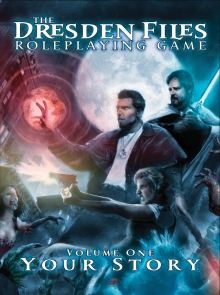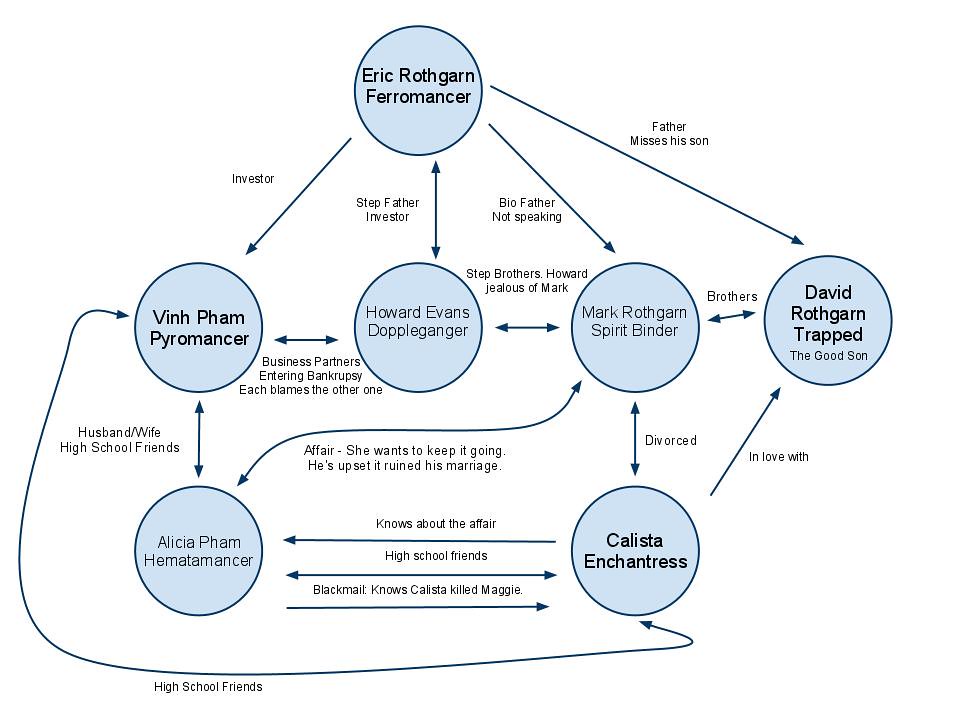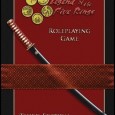 GM: Sean Nittner
GM: Sean Nittner
Sacrifices: Felipe Morales, Eric Zimmerman, Karen Twelves, Matthew Grau, Mike Muldoon, Travis Smalley
System: Dresden Files
This was my first time running a horror game. Had it not been the Dead of Winter Horror Invitational, it probably would have never happened. I like lots of horror elements; powerlessness, uncertainty, transgression, etc. Typically however, I weave them into games when dramatically appropriate. Can I hurt you when your wife leaves you? Yes. Can I hurt you even more when you find out she is pregnant and you’ll never see the child? What if you don’t know who the father really is? Hell yes. But is that horror? Not really. Horror tropes, but not the whole package, that is what I’ve done so far.
Horror Elements
This however was my first attempt to bring it. I started with the horror elements I wanted to focus on (my notes, with additions from Lenny Balsera)
Uncertainty:
- As GM: Don’t answer all questions at once. Often wait a few minutes. Say, I’ll get back to you on that, or you’re not sure, or give me a minute and then move onto another subject.
- [LENNY: Also, when you’re revealing details, remember that you’re not obligated to also explain what the facts mean. “The blood trail generally leads toward the grate in the floor, though there are tendrils of it branching away from the main trail periodically. You also see a stain on one wall.” If I don’t tell you that it was from the victim whipping his limbs about frantically, what you imagine from that sentence is way worse.]
- Unveil character background in play. What they’ve done to each other that they didn’t know. Who they might have hurt.
- Game takes place in a hotel. The hotel has been remodeled. Carpets on top of the old wooden floors, wallpaper, already starting to peel in places over the old barren walls.
- Shadows that move as doors open. Strange sounds of something present, but are probably mundane in origin.
Isolation
- A dusty roadside motel in the middle of nowhere.
- The place is crazy windy. A storm coming through. Reports on the radio, this one will be the worst in years.
- A hunched over crone of a clerk, never there when you need her. Always showing up when you want privacy.
- Other tenants, nice people, packing up an leaving in the middle of the night, only to get in an “accident” on their way out.
Powerlessness
- Loss will be prevalent. Loss of things that are outside the character’s control. Losing the one remaining solid client via a voicemail. A car accident in the parking lot, damaging their shiny car. The power going out. A credit card declined because of fraudulent activity. No cell phone service. Losing your keys, or a door stuck a jar to your room.
- Faculties will betray us. You hand is too cold to hold onto something. Misunderstanding a shadow for a person. Being unable to remember things that just happened (like what room number you were given and they key gives you no clue).
- The room the ritual went down in, is occupied by someone else when you arrive.
- A toilet breaks and water spills everywhere, grounding out magic.
- [LENNY: These are not compels, either. Important.]
Transgression.
- They’ve all committed several crimes: knowingly breaking a law, possibly leaving a friend behind, taking from others so that they could have more.
- Everything is cold. Colder than it should be. The heating doesn’t work. Once the chill gets in, it won’t go away.
- Everyone has hurt each other and will have to do it again unless they are willing to face the Demon. I think I’m going to start a few of them off with an “extreme consequence” already taken representing their damage from the last time.
From these I tried to envision what it meant to be out of control, to be afraid and uncertain, and that lead me to a moves and principles model derived from Apocalypse World:
Principles:
Talk about what’s wrong (A caravan of RV families here, the rooms wallpapered and peeling, the smell of air freshener masking something else, the iron horseshoe eroded over the doorway)
Talk directly to the characters (Eric, Alecia, Mark, Howard, Vinh and Calista)
Make your moves but don’t explain why.
Kill NPCs discriminately (people need to die as a cost for what went wrong. Make them sympathetic, make them lovable, then kill them)
Name people just before killing them
Ask no-win question and build off the answers
Respond with malice and intermittent rewards
Be a fan of the characters suffering
Think about the past, and the never never, what’s happening there (Eric’s father, Des Faireyes, The campers, David)
Sometimes disclaim answering.
Moves:
Take something away (It may be trivial at first, but regardless is irrevocable.)
Put someone in a spot to look stupid, embarrassed, or irrational. (Forgot your room number, door is stuck, credit card expired, etc)
Separate them. (Dust storm, those who leave die)
Capture someone. (Getting lost in the woods, found by the warden, stuck in their room)
Trade harm for harm (physical acts result in painful cuts, social acts result in enmity, distrust, fear, mental acts result in hubris, wrong knowledge, distortion)
Announce off-screen badness (shrieking down the halls, the phone ringing in an empty room, a ball rolling but no kid to play with it)
Family
So there is my baseline, now I wanted a really messed up situation. So I started working backwards from the chaos I wanted and arranged for:
Eric – The father figure who has failed all of his sons and lost one of them. The demon’s host even if he won’t admit it to himself. He perpetuated the demon’s existence, and brought the troubles to all these people because of a girl (Alicia), a girl that reminded him of his ex-wife.
Mark – The favorite son. The baby boy. The one that had it all and then blew it. He was married to Calista but slept with Alicia. He gave up his older brother David to a demon and now his father wouldn’t talk to him. And yet, still the center of attention.
Calista – Mark’s ex-wife who always loved David and saw the group was never going back for him, so she killed of their own and made it look like it was the demon, just for a chance to get David back.
Howard – Eric’s step-son, always wanting what Mark received effortlessly, a loving father, acceptance, home. He was the one that duped them all and set David up, which he was now trying to hide. In business with Vinh, financed by Eric and trying to impress his step-father, but watching things fall through the cracks and lying the whole way down.
Vinh – The comic foil, the closest thing to a good person in this group. He loves his wife Alecia, but knows their childhood “friend” Howard is ripping them both off. Mostly he just wants to cut and run, let the messed up father and son showdown happen on its own, but he has killed for them, and that makes him just as guilty as the rest.
Alicia – Vinh’s wife, in love with Mark, and the reason deals with demons were made in the first place (Eric knew the demon could protect her, and all of them for that matter, from a warden that would otherwise be racking up a head count).
All of them – Lawbreakers trying to pretend what they did in the past never happened. Trying to pretend that they were good people.
There are more details about their sordid past, but I don’t want to drop page long backgrounds here. Some of it is explained in the relationship map here:

Situation
Messed up relationships established I framed the opening scene. Ten years ago you made a deal with a demon Des Faireyes to hide you all from a Warden that was probably going to kill at least one of you, if not all. His price, one of your souls, which Mark convinced him to take in five year increments, each of you serving a term. Only five years ago, when you were all supposed to go back and have someone take David’s place, nobody showed up, and David remained trapped in the Nevernever, a servant of Des.
A year after that one of you was found murdered, Calista did it, but everyone though it looked like the Demons work and agreed that the next time they had a chance, they would go and make good on the deal. Alicia knows, but she’s not telling anyone so long as Calista doesn’t tell Vinh about Alicia and Mark.
Here you are, a seedy roadside hotel, waiting to go back and make things right, if you can.
Actual Play
I talked a lot about the set up for the game, what I had put out there from the start. The actual play however, reads in my mind a lot more like what worked and what didn’t, so I think I’m going to skip right to that.
What rocked
The weight of conflicts was exactly where I wanted it to be. Since most of them were social, and I didn’t allow for any stress recovery (it didn’t come back after a conflict as per normal), many people were inclined towards giving in rather than being beaten up all game. The winner of a conflict got to permanently change an aspect (either theirs or one of their opponent’s) that was relevant to the conflict. This resulted in some pretty cool and organic changes in the characters. Sadly changing aspects became cheapened by me letting them ALSO do it in a different way (see below).
At one point Matthew and Eric had a conversation in character (Howard and Eric respectively) that was just chilling. Afterward Matthew looked up to me and said it was the most uncomfortable conversation he’s ever had in a game. That was a reward in itself.
The initial character conflicts between Mark and Calista, Mark and Alicia, Alicia and Calista, Howard and Vinh, Howard and Eric, and finally Mark and Eric were pretty damn awesome. All those tensions that I build up made for quite a nice dysfunctional family gathering.
It is kind of sad to say but I think the highlight of the game was the brain damanged warden. His mind had been altered by Calista and as per the Dresdenverse axioms of messing with people’s minds, the results were not pretty. Yep, he had forgotten about them, but he had also forgotten a lot of other things, like that he was a warden, or how to drink. So at one point Calista approached him and offered him a glass of wine. I promptly picked up a water bottle and just started spilling water all over myself pantomiming the character. The warden, messed up as he was, never realized exactly what was happening, and when it was pointed out to him, just shrugged and explained that he drank too much, it made him sloppy. The players really lit up as I drenched myself. A cheap trick, but one that was received well.
A couple of my early moves (getting a sliver, losing signal, forgetting your room number, etc) worked quite well, in fact I would say the game was very strong in the opening scenes. As it went on, however the tension and the pacing started flagging…
What could have been improved
While the game started off in a very uncomfortable place (I think one suitable to horror) I didn’t escalate it. There were not enough external bad things going wrong that the players HAD to respond to. I was really hoping for an internal drama where the characters tore each other apart and didn’t want to throw in too many distractions, but what I found was the story sat on the same beat for a long time and the inter-party tension I was looking for got stale. The story needed to be shaken up both to keep the horror present and to give the character a release from the tension of the family drama. I should have done that by hammering them with increasing threats. Overall there was too much time to idle, which led to…
The planning scene. I am not sure how we got there but eventually the wave of “this is messed up” subsided and the players started planning how we can “fix” this. As soon as that started the mood of the game was lost, or at least the mood I was trying to push for. I lost traction and started slipping into the players trying to “win” and me trying to challenge that, which makes for a very non-horrific game.
The character backstory had some nuance (who cheated and how) that was too fiddly. I could imagine it in my head but didn’t convey it clearly enough in the background pages. Considering how hard I worked to try and make it clear, I look back now and think I should have just re-imagined the betrayals into something less convoluted.
Speaking of betrayals, this game had secrets. I hate secrets, but I thought I could pull the same move I did in Flagship Atlantis where I gave the players such a big reward for revealing their secrets that everyone would want to get them on the table. Nope. I made a bounty but it wasn’t sweet enough, or the secrets were too dire. In the end two of the secrets were never revealed and I felt an empty disappointment, like I was expecting too much, not offering enough, or just not creating a safe space for the horror to be unveiled.
I had this neat idea for skills and aspects. Normally when I make Dresden characters I only pick a couple skills, leave the other ones blank and let the players fill them in during the game. For a horror game I wanted things more locked down though, so instead, I picked all the skills and I gave the players big black sharpies. I said “This represents your characters as they were 10 years ago, as everyone else remembers them, but if you decided people don’t know you as well as they think they do, cross out a skill or aspect and write in another one in its place. You can do this up to five times during the game.” Well, it sounded cool, but I realized I shouldn’t have included aspects in that option. The characters all had a number of messed up aspects that were there to drive them towards conflict with each other and several of the players used this ability to rewrite those aspects and “fix” their characters. Still a cool idea in concept, but next time it’s skills only.


Hey Sean. Did you get my message about playtesting?
Yep, sorry I didn’t get back to you earlier. Reply sent.
For a very simple, introductory horror scenario I’ve always been quite fond of I Want You To Kill The Ice Cream Man. A great one-shot.
Cool, thanks Lev, I will definitely check it out!